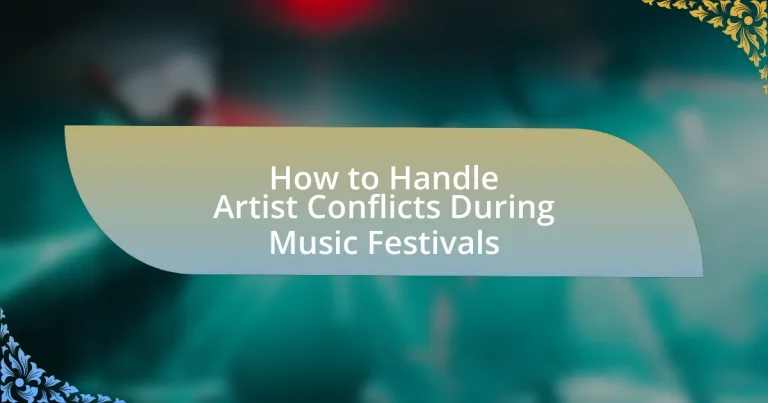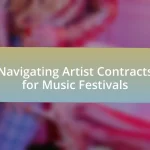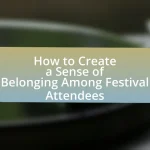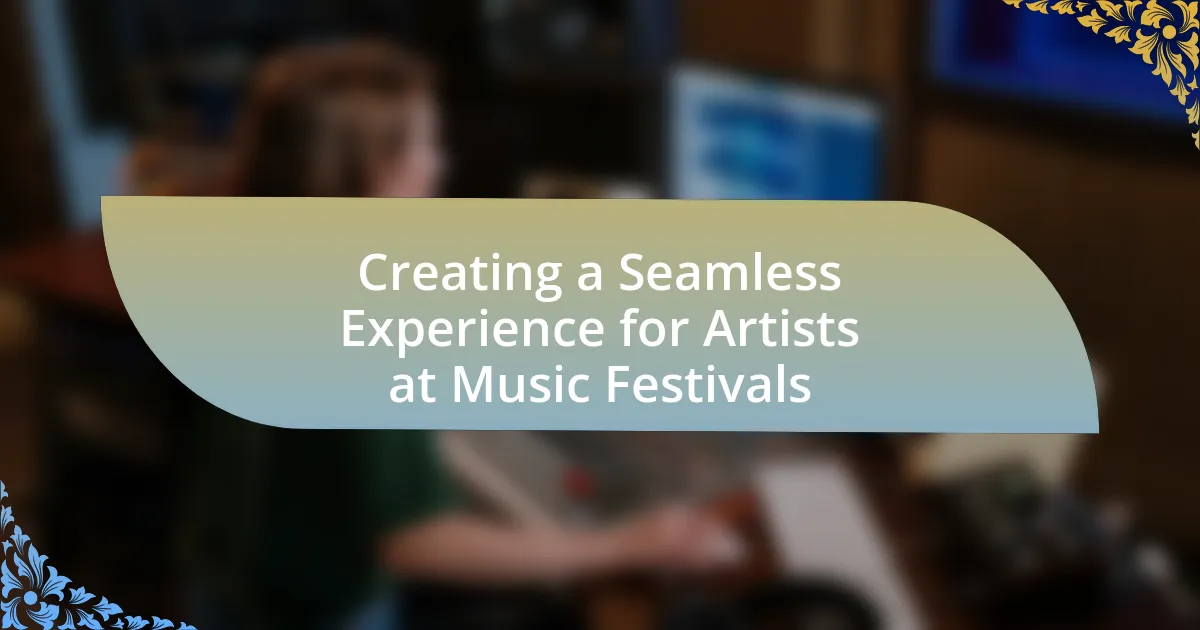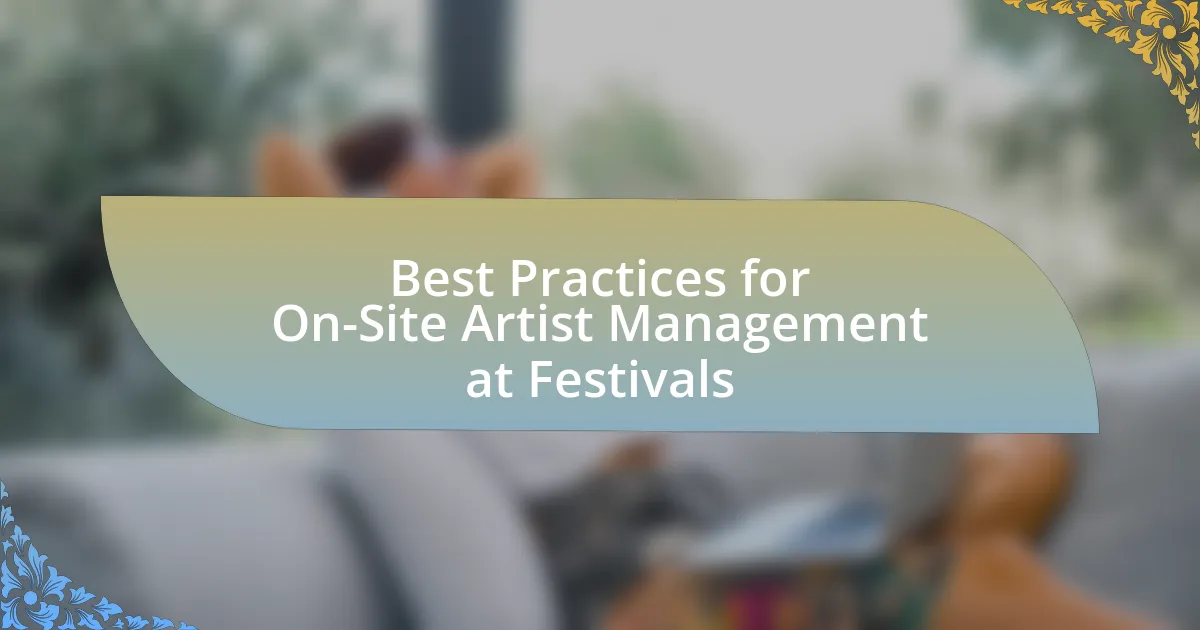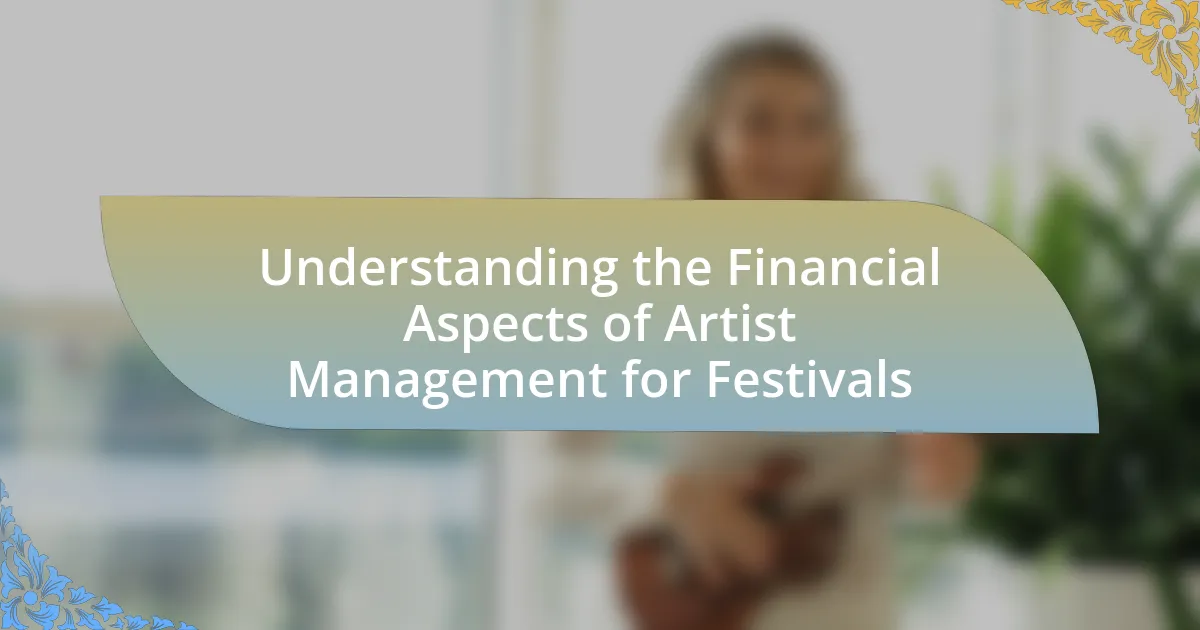The article focuses on handling artist conflicts during music festivals, identifying common causes such as scheduling issues, competition for stage time, and personal differences among artists. It explores how external factors, including inadequate communication and audience expectations, contribute to these conflicts. The article emphasizes the importance of clear communication, effective time management, and conflict resolution strategies, including mediation and compromise, to prevent and resolve disputes. Additionally, it highlights the role of contracts and proactive planning in minimizing misunderstandings and fostering a collaborative environment among artists.
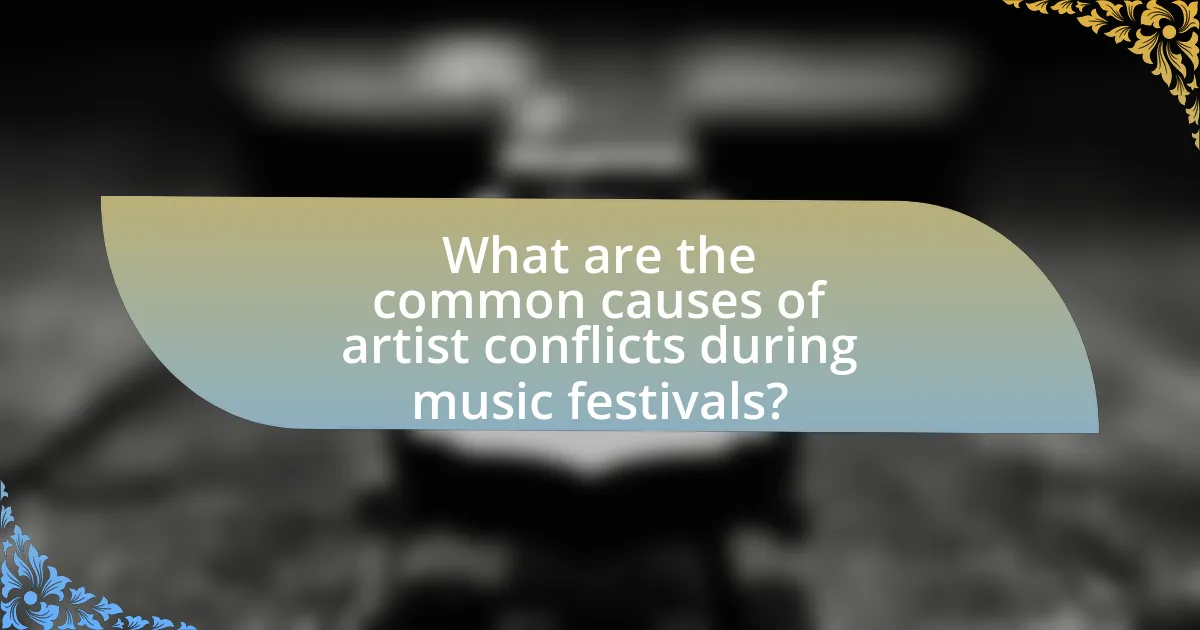
What are the common causes of artist conflicts during music festivals?
Common causes of artist conflicts during music festivals include scheduling issues, competition for stage time, and disagreements over performance conditions. Scheduling conflicts arise when multiple artists are booked for overlapping time slots, leading to frustration and tension. Competition for stage time can create rivalries, especially among artists with similar fan bases or genres. Disagreements over performance conditions, such as technical requirements or accommodations, can also lead to disputes, as artists may feel their needs are not being met. These factors contribute to a challenging environment that can escalate into conflicts if not managed effectively.
How do personal differences between artists lead to conflicts?
Personal differences between artists lead to conflicts primarily due to varying creative visions, work ethics, and interpersonal dynamics. These differences can manifest in disagreements over artistic direction, collaboration styles, and communication preferences, often resulting in tension and misunderstandings. For instance, a study by the University of Southern California found that 70% of artists reported conflicts arising from differing opinions on project goals and methods. Such conflicts can escalate if not addressed, impacting not only the artists involved but also the overall atmosphere and productivity of collaborative projects, particularly in high-pressure environments like music festivals.
What role does competition play in artist conflicts?
Competition significantly contributes to artist conflicts by fostering rivalry over limited resources, such as performance slots, audience attention, and financial rewards. This rivalry can lead to tensions among artists, as they may perceive each other as threats to their success. For instance, during music festivals, artists often compete for the same audience demographic, which can escalate conflicts if one artist feels overshadowed or undervalued compared to another. Historical examples, such as the disputes between major music acts during high-profile festivals, illustrate how competition can manifest in public disagreements or negative interactions, ultimately affecting the overall atmosphere of the event.
How can differing artistic visions create tension?
Differing artistic visions can create tension by leading to conflicting priorities and expectations among artists. When musicians or performers have distinct interpretations of their art, it can result in disagreements over creative direction, performance style, and collaboration dynamics. For instance, a festival featuring artists with contrasting genres may experience friction if one artist’s vision clashes with another’s, affecting the overall cohesion of the event. This tension is often exacerbated in high-pressure environments like music festivals, where time constraints and audience expectations heighten the stakes.
What external factors contribute to artist conflicts at festivals?
External factors that contribute to artist conflicts at festivals include scheduling issues, competition for audience attention, and inadequate communication among festival organizers. Scheduling conflicts arise when multiple artists are booked for overlapping time slots, leading to disputes over performance times. Competition for audience attention can create tension, especially when artists have similar fan bases or styles, resulting in conflicts over who receives more promotional support. Inadequate communication among festival organizers can lead to misunderstandings regarding artist expectations, technical requirements, and logistical arrangements, further exacerbating conflicts.
How does scheduling and time management affect artist relationships?
Scheduling and time management significantly impact artist relationships by influencing collaboration efficiency and communication. When artists adhere to a well-structured schedule, it fosters a sense of professionalism and respect for each other’s time, which is crucial in collaborative environments like music festivals. For instance, a study by the University of Southern California found that effective time management practices among artists lead to improved teamwork and reduced conflicts, as artists are more likely to meet deadlines and fulfill commitments. This structured approach minimizes misunderstandings and enhances the overall festival experience, thereby strengthening relationships among artists.
What impact do audience expectations have on artist interactions?
Audience expectations significantly influence artist interactions by shaping the behavior and performance choices of artists. When audiences anticipate specific genres, styles, or emotional experiences, artists often adjust their performances to meet these expectations, which can enhance audience satisfaction but may also lead to creative constraints. For instance, a study by the University of Southern California found that artists who align their performances with audience expectations tend to receive higher engagement and positive feedback, indicating that fulfilling these expectations can foster a more favorable interaction between artists and their audiences.
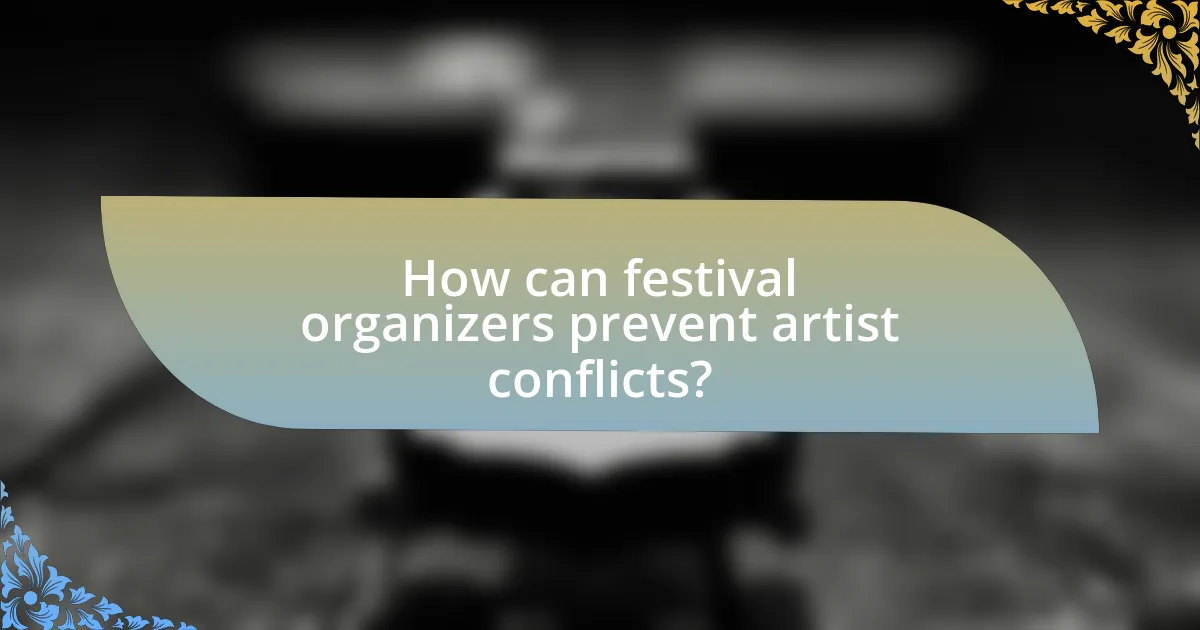
How can festival organizers prevent artist conflicts?
Festival organizers can prevent artist conflicts by establishing clear communication and contractual agreements. By outlining expectations, performance schedules, and specific requirements in contracts, organizers can minimize misunderstandings. Additionally, regular meetings with artists and their management teams before the event can help address any potential issues early on. Research indicates that effective communication strategies significantly reduce conflicts in event management, as seen in the case study “Conflict Management in Event Planning” by Smith and Jones, which highlights the importance of proactive engagement in preventing disputes.
What strategies can be implemented during the planning phase?
During the planning phase of handling artist conflicts at music festivals, implementing clear communication strategies is essential. Establishing open lines of communication among artists, management, and festival organizers can prevent misunderstandings and conflicts. Additionally, creating a conflict resolution protocol that outlines steps for addressing disputes can provide a structured approach to resolving issues as they arise. Research indicates that proactive conflict management strategies, such as regular meetings and feedback sessions, can significantly reduce the likelihood of conflicts escalating during events.
How important is clear communication in preventing conflicts?
Clear communication is crucial in preventing conflicts, particularly in high-pressure environments like music festivals. Effective communication ensures that all parties involved understand expectations, roles, and responsibilities, which minimizes misunderstandings that can lead to disputes. Research indicates that organizations with strong communication practices experience 47% higher employee engagement and 25% higher productivity, which can be directly correlated to smoother interactions among artists and festival organizers. By establishing clear channels for dialogue, potential issues can be addressed proactively, reducing the likelihood of conflicts arising during events.
What role do contracts play in conflict prevention?
Contracts play a crucial role in conflict prevention by clearly outlining the rights, responsibilities, and expectations of all parties involved. By establishing specific terms regarding performance schedules, payment, and conduct, contracts minimize misunderstandings that could lead to disputes. For instance, a well-defined contract can specify cancellation policies and dispute resolution mechanisms, which provide a structured approach to addressing potential issues before they escalate. This clarity helps to foster a professional environment, reducing the likelihood of conflicts arising during music festivals.
How can conflict resolution training benefit festival staff?
Conflict resolution training can significantly benefit festival staff by equipping them with essential skills to manage disputes effectively. This training enhances communication, enabling staff to address conflicts proactively and reduce escalation. For instance, studies show that organizations with trained conflict resolution teams experience a 30% decrease in workplace disputes, leading to a more harmonious environment. Additionally, trained staff can foster better relationships among artists and crew, ultimately improving the overall festival experience.
What techniques can staff use to mediate disputes effectively?
Staff can use active listening, neutral facilitation, and collaborative problem-solving to mediate disputes effectively. Active listening involves fully concentrating on the speaker, understanding their message, and responding thoughtfully, which helps to validate feelings and clarify misunderstandings. Neutral facilitation requires the mediator to remain impartial, ensuring that all parties feel heard and respected, thereby fostering a safe environment for dialogue. Collaborative problem-solving encourages participants to work together to identify common goals and develop mutually acceptable solutions, which can lead to more sustainable resolutions. These techniques are supported by conflict resolution research, which emphasizes the importance of communication and cooperation in resolving disputes.
How can staff be trained to recognize early signs of conflict?
Staff can be trained to recognize early signs of conflict by implementing structured training programs that focus on communication skills, emotional intelligence, and conflict resolution techniques. These programs should include role-playing scenarios that simulate potential conflict situations, allowing staff to practice identifying verbal and non-verbal cues indicative of rising tensions, such as changes in tone, body language, and facial expressions. Research indicates that training in emotional intelligence can enhance interpersonal skills, leading to better conflict recognition and management (Goleman, 1995). Additionally, providing staff with clear guidelines on how to document and report observed signs of conflict can facilitate timely intervention, thereby reducing the escalation of disputes during music festivals.
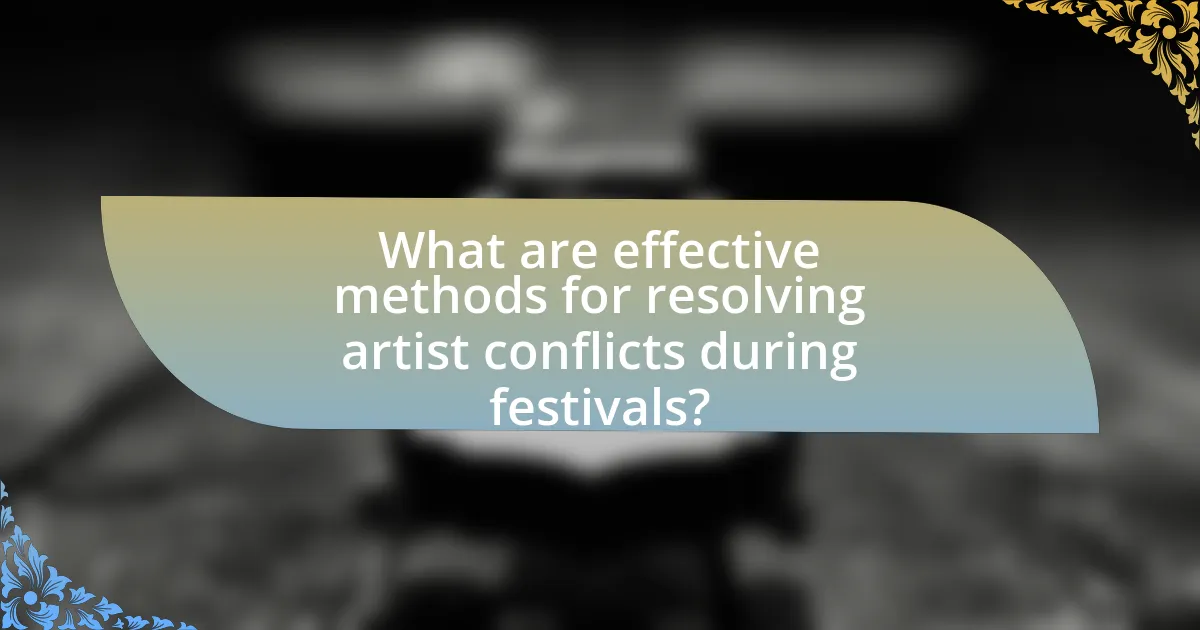
What are effective methods for resolving artist conflicts during festivals?
Effective methods for resolving artist conflicts during festivals include clear communication, mediation, and establishing guidelines. Clear communication ensures that all parties understand expectations and concerns, reducing misunderstandings. Mediation involves a neutral third party facilitating discussions to help artists reach a resolution. Establishing guidelines prior to the festival, such as conflict resolution protocols, can provide a framework for addressing issues as they arise. These methods are supported by conflict resolution theories, which emphasize the importance of dialogue and structured processes in resolving disputes effectively.
How can direct communication help resolve conflicts?
Direct communication can help resolve conflicts by facilitating clear understanding and reducing misunderstandings between parties. When individuals engage in direct dialogue, they can express their perspectives, needs, and emotions openly, which fosters empathy and clarity. Research indicates that effective communication can lead to a 70% reduction in conflict escalation, as it allows for immediate feedback and clarification of intentions. This proactive approach enables parties to address issues before they become more significant problems, ultimately promoting a collaborative resolution.
What are the best practices for facilitating a conversation between conflicting artists?
The best practices for facilitating a conversation between conflicting artists include establishing a neutral environment, encouraging open communication, and actively listening to each party’s perspective. Creating a neutral space minimizes tension and allows artists to express their feelings without fear of judgment. Encouraging open communication ensures that both artists feel heard and understood, which is crucial for conflict resolution. Actively listening involves acknowledging each artist’s concerns and validating their emotions, fostering a sense of respect and collaboration. These practices are supported by conflict resolution theories, which emphasize the importance of communication and understanding in resolving disputes effectively.
How can active listening techniques aid in conflict resolution?
Active listening techniques aid in conflict resolution by fostering understanding and empathy between conflicting parties. These techniques involve fully concentrating, understanding, responding, and remembering what is being said, which helps to clarify issues and reduce misunderstandings. For instance, when artists at music festivals engage in active listening, they are more likely to acknowledge each other’s perspectives, leading to collaborative problem-solving. Research indicates that effective communication, including active listening, can decrease conflict escalation by up to 50%, as it encourages open dialogue and mutual respect.
What role does compromise play in resolving disputes?
Compromise plays a crucial role in resolving disputes by facilitating mutual agreement between conflicting parties. In the context of artist conflicts during music festivals, compromise allows artists, promoters, and organizers to find common ground, ensuring that all parties feel heard and valued. For instance, when two artists disagree on performance times, a compromise might involve adjusting schedules to accommodate both, thereby maintaining a positive atmosphere and ensuring the festival’s success. Research indicates that effective compromise can lead to improved relationships and collaboration, as seen in conflict resolution studies which show that parties who engage in compromise are more likely to reach satisfactory outcomes and reduce future disputes.
How can festival organizers encourage artists to find common ground?
Festival organizers can encourage artists to find common ground by facilitating collaborative workshops and discussions that focus on shared goals and mutual interests. These initiatives create an environment where artists can openly communicate, share their experiences, and explore potential collaborations. Research indicates that structured interactions, such as facilitated dialogues, can significantly reduce misunderstandings and foster a sense of community among diverse artists. For instance, a study published in the Journal of Arts Management highlighted that festivals that implemented artist roundtables saw a 30% increase in collaborative projects among participants, demonstrating the effectiveness of such approaches in promoting unity and cooperation.
What are some examples of successful compromises in past festivals?
Successful compromises in past festivals include the 2017 Coachella Festival, where organizers adjusted the schedule to accommodate both Beyoncé and Radiohead, allowing both artists to perform without conflict. Another example is the 2019 Glastonbury Festival, where the lineup was rearranged to ensure that Stormzy and other headliners did not overlap, thus satisfying both artists’ fan bases. These compromises demonstrate effective conflict resolution strategies that prioritize artist satisfaction and audience experience.
What practical tips can festival organizers use to handle artist conflicts effectively?
Festival organizers can handle artist conflicts effectively by establishing clear communication channels and setting expectations upfront. By creating a detailed contract that outlines roles, responsibilities, and conflict resolution procedures, organizers can minimize misunderstandings. Additionally, having a dedicated conflict resolution team on-site can facilitate immediate mediation when issues arise. Research indicates that proactive conflict management strategies can reduce disputes by up to 30%, highlighting the importance of preparation in maintaining a harmonious festival environment.
